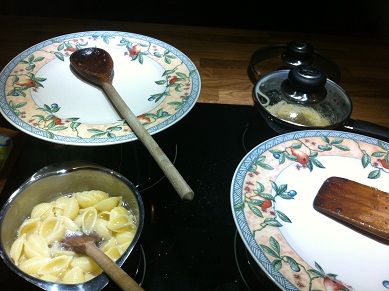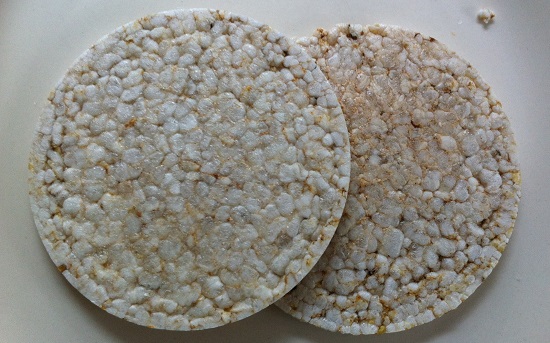Let’s imagine you have finally managed to get the attention of that gorgeous girl who works in accounts. Or the guy you have fancied for years has finally asked you out on a date. “I’ve got an allergy to nuts.” she says. If you don’t know much about allergies, what do you do? Serious allergies can be life threatening so should be taken seriously, but not allowed to ruin a night out for fear of something going wrong.
You might not even discuss the finer points of your food sensitivities at this point but if your suggestion of an Indian meal or that you’ll cook them dinner seems to concern them or you there are some really simple things you can do to avoid disaster.
Perhaps your best friend has serious allergies and you’d love to invite her round but are filled with fear of making a mistake and poisoning her.
Maybe you’re married, living with or have been going out with some who has serious food alergies for some time. Do you cook for them? Or do you let them get on with it, safe in the knowledge that they know best? Spare a thought for how it feels to have to cook for yourself all the time, to be the one experimenting because your other half is either too lazy or too scared to step up to the challenge? I’m not having a go here, not at all. Having allergies has forced me to experiment and given me a real love and passion for trying out different organic, great, tasty and healthy meals. Once in a while though it would be nice if someone else had a go too…
It’s a daunting prospect. You don’t want to endanger your date/friend/partner by putting them in a difficult situation, or worse still, making them ill. The key here is always to keep it simple. It’s the little things that count. The very fact that you care enough and are willing to make an effort to consider their needs should earn you a few brownie points.
Cooking a meal for someone with allergies is far far easier than going out for dinner. You’re in control and as long as you plan, are careful and understand what to avoid you should have a successful meal with no adverse reactions.
You do need to take some steps to ensure your meal is a success, follow these simple tips and you can’t go wrong.
1. How serious is it?
Make sure you find out exactly what’s what. How serious is their allergy? What exactly are they allergic to? Do they carry an EpiPen? If they do, make sure you know how to administer it should the need arise – but let’s assume that wont happen on your watch, because you are going to take ever precaution to avoid disaster.
2. Don’t moan it was too much effort
You want to make them feel special so do not, under any circunstances moan you’ve had to bust a gut to create this meal. Being invited out to dinner doesn’t happen that often for people with allergies because it’s a big worry that most people would rather be without. The fact that you’re willing to make the effort and take it seriously will be sure to win them over.
3. Get a list of what to avoid
Make sure you know exactly what your date is allergic to. Write it down, and any other derivatives that it can be hidden in. If they have multiple allergies and intolerances make sure you understand them fully, ask them what they especially like to eat, what they can eat, and what they cook most often. It will help you get an idea of what they like and may give you some ideas of what to cook yourself.
4. Keep it simple
Don’t try to over excel yourself here. You don’t have to prove you’re Jamie Oliver, just make sure you pick a recipe that is simple and easy, but don’t be afraid of adding flavour. Check with your guest to ensure they can have the herbs, spices and seasoning you want to use, but meals without nuts, dairy, gluten, or whatever food you need to avoid can be just as tasty. A simple stir fry, a casserole, or roast some meat and veg just in olive oil and herbs are all fairly easy to do and leave you more time to speak to your date.
5. Avoid things in packets
Don’t use things that come out of a packet; anything that needs a list of ingredients can bring danger into the scenario. You could easily miss something; allergens can be hidden by another name e.g. Dairy could be listed as lactose or whey. So if you are looking at a piece of plain meat, carrots, potatoes and other beautiful natural and preferably organic foods you are going to be pretty safe. One thing to watch here are tubes of garlic paste. Just stick to cloves of garlic and you can’t go wrong.
6. Buy or borrow an allergy free cook book
If you want to really impress them you could buy or ask if you can borrow a cookery book from them. This will make them even more secure that the meal you cook will be safe for them. It will also give you loads of ideas of good recipes and should provide enough inspiration for planning your meal. If you follow a recipe from a specialist cook book you should be quite secure that no mistakes will be made.
7. Store any allergens in your home safely away
If you have milk, nuts, gluten etc. in your home, and you very probably do, make sure they are safely stored away in air tight containers and make sure surfaces are completely clean before you begin cooking. Even tiny crumbs from the work top getting into contact with what you cook could make a coeliac very ill. Cross contamination is often where problems occur so it’s better to be safe and put anything potentially dangerous away.
8. Beware the kitchen hazards
There are some things you should just steer clear of, just to be safe. Don’t use the toaster if you’re cooking for someone with coeliac disease or a wheat allergy – crumbs from wheat/gluten bread will contaminate anything else that gets toasted. Similarly, beware of plastic and wooden utensils for the same reason. They may look clean but can harbour small traces as they get grooved and pitted, so stick to glass and metal e.g. chopping boards
9. Always read the label
If you really must use something from a packet, and let’s face it, there are actually loads of safe things to eat that come out of a packet, make sure you read the label really thoroughly. There are some great new iPhone apps such as FoodWiz and Sainsbury’s ‘Isitinit‘ which can be used to scan the bar codes of packets to identify any allergies lurking within. Both offer a free trial so give them a go when you go shopping for your allergy friendly cooking ingredients and scan anything you’re not sure about. If you have a good local health food shop go in and ask their advice. Most are run by passionate foodies who will be more than happy to point you in the right direction for safe foods.
10. Keep the packaging
If you have used anything from a packet, avoid having to fish out the now grubby and food smudged wrappings from the bin. Make it easy for your new date or partner by offering to let them see the packets of anything you have used to make the meal. It just means they don’t have to ask or feel they are putting you out.
11. Barbeque suggestions
BBQs can be dangerous places for cross contamination. The safest bet would be to cook the food for the allergic person separately before hand, or cook inside to ensure it’s safe. Another brilliant idea is to use foil. Wrap fish in foil and cook with a slice of onion, white wine, lemon juice, garlic and salt and pepper for a delicious and safe alternative. Or just lay the foil on the rack so it doesn’t come into contact with anything else. Foil can be useful in the kitchen too if you think your oven, shelves or baking trays are perhaps not as spick and span as they should be.
12. Listen to those alarm bells
OK so you’re nearly there. You’ve made sure you are as prepared as you can possibly be. Everything is going according to plan. You look great, he or she looks great. Just don’t let your guard down. It’s very easy to just reach for something to add a bit of flavour or change your plans a bit as you go along. If you have even a niggle at the back of your mind, ask the question. “Are you OK with corn flour?” The stupider the question the better. What you think is a daft thing to ask may well not be and could avert the danger of you adding the wrong thing to your meal. Habits get stuck too. People often ask me if I take milk with my tea, I say no, then they still add the milk, just out of habit, even though they hadn’t intended to, understood that I couldn’t have the milk, etc. etc. They end up feeling cross with themselves and have to make another cup and you have to wait a bit longer for your tea! Don’t get angry with people though. It’s difficult to change habits, but do watch out that none of your habits creep into your allergy friendly meal. For instance don’t stir one dish with a spoon from another containing all allergen. This is easily done when making a cup of tea for someone, and equally when cooking. And the danger when cooking is that the little ingredient added to a meal may not be obvious to the eye, if you can’t tell you added it neither will your allergic guest so always check, check and check again.
Now you’ve done all the hard work, the table is set, candles lit, flowers in a vase (unless they are allergic to flowers!) and you in your best togs. All that’s left now is to enjoy your meal.
Have you cooked a meal for someone with allergies? Did you find it easy or hard? Are these tips helpful? Please leave comments here, especially if I’ve missed something you think should be included…












Amazing that someone cares enough to make this list… It is definitely appreciated